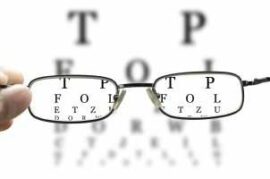Posted by:
Eyes on Rosemont
in Refractive Disorders, We Can Help With
Somewhere around the age of 40, most people’s eyes lose the ability to focus on close-up objects. This condition is called presbyopia. You may start holding reading material farther away, because it is blurry up close. Reading suddenly gives you eyestrain. You might wonder when manufacturers started putting such small print on everything. Symptoms of […]
Read
More
Posted by:
Eyes on Rosemont
in Refractive Disorders, We Can Help With
Myopia, or nearsightedness, means that your eyes can see close objects clearly but struggle to see things in the distance. Nearly 30 percent of Americans are nearsighted. This condition usually develops in children and teenagers, up to about the age of 20. A teacher or parent might notice a child squinting at the chalkboard or […]
Read
More
Posted by:
Eyes on Rosemont
in Refractive Disorders, We Can Help With
There are several types of refractive surgery available to correct vision problems caused by refractive errors, including: LASIK (laser-assisted in situ keratomileusis) Custom or bladeless LASIK Photorefractive keratectomy (PRK) Laser epithelial keratomileusis (LASEK) Epi-LASIK Conductive Keratoplasty (CK) Phakic Intraocular Lenses (IOLs) Refractive Lens Exchange (Clear Lens Extraction) Most of these procedures involve reshaping the curvature […]
Read
More
Posted by:
Eyes on Rosemont
in Refractive Disorders, We Can Help With
A normal cornea — the clear front covering of your eye — has a round curve, like a basketball. However, many people have an irregularly shaped cornea while others have an irregularly curved lens. Both cases can cause light that enters the eye to bend the wrong way, causing blurry vision. This disorder is called […]
Read
More
Posted by:
Eyes on Rosemont
in Refractive Disorders, We Can Help With
People with hyperopia, also known as farsightedness, can usually see objects in the distance, but their close vision is blurry. Symptoms of untreated hyperopia include: Difficulty concentrating on near work, such as reading Eye strain Headaches after reading or other activities involving close focus Aching, burning eyes Irritability from concentrating on tasks In children, eyes […]
Read
More





